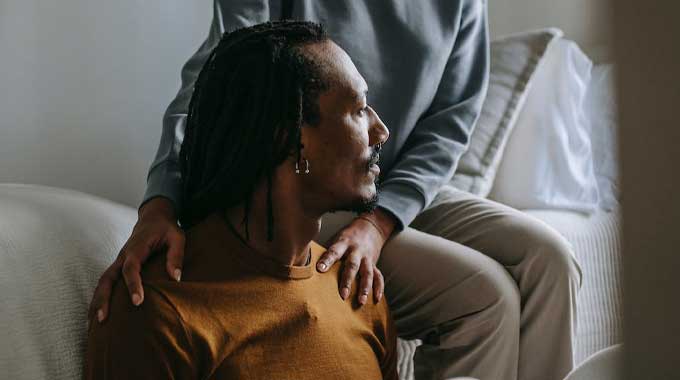You are probably aware that alcohol is one of the most common legal drugs to currently exist. Being legal, it is hard to avoid in day-to-day life, whether that is going to the grocery store, having a party with friends, or going to a family meal. Because of its legal status, alcohol is perhaps not seen as a damaging substance, let alone even a drug, but this is not the case.
While some of the effects of withdrawal from alcohol can be dangerous, one of the most common physical symptoms involving withdrawal from alcohol use is a headache. Some will last for a short amount of time, and others will last indefinitely. The length of time that your alcohol withdrawal headaches last will depend on which stage of withdrawal you are in. This is your go-to guide for all things related to alcohol abuse.
Alcohol Use
According to the National Institute on Alcohol Abuse and Alcoholism (NIAAA), alcohol abuse, specifically Alcohol Use Disorder (AUD), is present in 14.5 million people aged twelve and over in the US alone. Even with its age restrictions and advice on bottles to be responsible, alcohol consumption can clearly cause a lot of problems for a user.
Most people drink alcohol in social situations, such as going to a party or going on a date. This is because alcohol is a central nervous system depressant. This means that it changes brain activity so that certain effects may arise from its use.
Effects of Alcohol Use
Some of these effects are the reason why a user might use alcohol in social situations. The drug can:
- Lower inhibitions
- Increase chattiness and confidence
- Reduce ability to think clearly and logically
Other, possibly less desirable effects, accompany these more desired effects. These can include:
- Slurred speech
- Loss of body coordination
- Visual impairment
- Slowed muscle reactions
- Poor memory
- High blood pressure
Generally, an individual will feel these effects when smaller amounts of the drug are taken, known as being “tipsy.” Remember though, how much it takes for an individual to feel the effects of alcohol can vary from person to person, so one person might need less than another to feel the same effects.
Alcohol Overdose (Alcohol Poisoning)
A lot of the time, people who use alcohol will do so by consuming large amounts of the drug very rapidly. Known as “binge drinking,” this form of alcohol use can result in life-threatening problems. Some of these severe symptoms include:
- Loss of consciousness
- Slowed, irregular breathing or cease to breathing
- Irregular heartbeat or stoppage of normal heart function
- Uncontrolled vomiting (can lead to asphyxiation)
- Seizures
- Dangerous levels of dehydration
- Extremely low body temperature
- Coma
If you, or someone you are with, have been consuming large amounts of alcohol and are experiencing some or any of these signs, it is important to seek medical care immediately. If this is the case, call 911 and explain exactly what the individual has taken. The sooner that they receive medical treatment, the more likely it is that they won’t face any permanent effects to their health.
Alcohol Addiction
When an individual is using alcohol on more days than they are not, then it could be the case that they are developing alcohol addiction. Signs of alcohol addiction are very similar to any other pattern of substance use disorder because addiction is a disease that can manifest in many different forms, whether that is alcohol, other drugs, or even gambling.
You can suspect that an individual has an addiction problem when they:
- Stop taking part in social events
- Develop a new social circle
- Stop carrying out day-to-day tasks and obligations
- Continue their addiction even though they want to stop
- Engage in secretive and abnormal behavior
Alcohol is not only psychologically addictive, but it is also physically addictive, meaning that a user may experience alcohol withdrawal symptoms when they stop drinking alcohol. When alcohol dependence occurs, it is important for an individual to seek medical care.
Alcohol Withdrawal Syndrome
Alcohol withdrawal syndrome is when an individual who is struggling with alcohol abuse develops generally negative and unwanted medical conditions after the user has consumed their last drink. Generally, after quitting alcohol, an individual can experience these alcohol withdrawal symptoms through different stages.
These stages include general timings of symptoms that you might expect to experience when withdrawing from alcohol starting with acute withdrawal, possibly leading on to prolonged withdrawal, and finally the potential of developing “post-acute withdrawal syndrome” (PAWS).
Acute Withdrawal
Acute withdrawal involves medical conditions that come on very quickly (within hours after your last drink). The first symptoms that someone struggling with substance abuse involving alcohol can expect to experience include:
- Tremors
- Anxiety
- Alcohol withdrawal induced headaches
- Insomnia
- Restlessness
- Nausea
- Depression
- Sleep disturbance
While they are rare, there are some severe symptoms that can have some very serious consequences. The NIAAA suggests that five percent of individuals going through alcohol withdrawal may experience some of these more severe symptoms:
- Seizures
- Delirium tremens (DT) – characterized by hallucinations, mental confusion, and disorientation
Because of the dangers associated with withdrawal seizures, delirium tremens, and other symptoms, it is of the utmost importance that individuals going through alcohol withdrawal symptoms receive treatment for it at treatment facilities.
An individual will experience these symptoms of alcohol withdrawal very intensely, and tend to peak at around seventy-two hours after their last drink). After this point, around day four, alcohol withdrawal symptoms will generally subside and become less intense; however it is possible that they may persist.
Prolonged Withdrawal
Prolonged withdrawal is, generally speaking, quite rare. However, it is still possible for individuals who have had long-lasting drinking habits involving heavy drinking to experience this stage of withdrawal symptoms.
Individuals who experience this stage of withdrawal can experience symptoms for longer than the average withdrawal experienced. This prolonged withdrawal can last for months or even a year. Because this stage of withdrawal is an extension of acute withdrawal, it is important that you seek medical intervention and adhere to any medical care that they have advised you, as symptoms can be life-threatening.
Post-Acute Withdrawal Syndrome (PAWS)
While an individual experiencing PAWS symptoms might feel them as intensely as acute symptoms, medical professionals don’t consider PAWS symptoms to be as dangerous as those experienced in the acute and prolonged phases of withdrawal. PAWS is a more protracted withdrawal that involves symptoms which can last for six months, or even more than a year after their last drink. However, in most cases, the moderate symptoms related to PAWS will eventually subside. Understandably, you may worry that your symptoms may never subside, but this is very rarely the case.
How Long Does it Take for Withdrawal Headaches to Go Away?
The answer to this question depends on what stage of withdrawal you are in. If you are in the acute withdrawal phase, it could be that your alcohol withdrawal headaches cease within a week or two. If you have passed this amount of time and are still experiencing headaches caused by alcohol withdrawal, then you could be experiencing either prolonged or post-acute withdrawal.
If your alcohol-related headaches tend to act in recurrent cycles of intensity, then it could be that PAWS is the reason that you are still experiencing alcohol withdrawal headaches. For example, your alcohol withdrawal headaches might be worse for a few days, then feel better for a few days, and then get worse again, and so on until your PAWS symptoms completely subside.
This timeline is not exact. You may experience your alcohol withdrawal headaches in weekly or monthly cycles for up to a year or more, so do not worry that something is wrong with you if you experience alcohol withdrawal headaches on a different timeline.
What Are Other Symptoms of Alcohol Withdrawal?
Other common symptoms are less serious but indicate a potential danger associated with withdrawal. Some of the physical symptoms that haven’t appeared above include:
- Low-grade fever
- Rapid breathing
- Tremor
- Profuse sweating
It could be that you are going through alcohol withdrawal but are not experiencing any of the more severe symptoms; however, this does not mean that you can go it alone. Your symptoms could indicate that you are at risk of more serious consequences of alcohol withdrawal. Therefore, you should always seek medical professional help when going through an alcohol withdrawal.
Addiction Treatment
There are many factors that lead an individual to develop a substance abuse disorder. There are equally as many treatment options available to ensure that you are able to achieve long-term recovery. This means that you can get a treatment placement tailored made to you.
Often, co-occurring mental health issues accompany any form of substance abuse. Therefore, the treatment for chronic alcohol use will most likely involve both medicinal and behavioral therapy to help you in your journey to sobriety.
Getting Treatment
At Cornerstone, we have been dealing with addiction treatment since 1984. Our caring and expert staff at our rehab facility in Orange County know addiction inside and out. Therefore, the treatment we provide is a treatment that you can rely on.
If you have related to any of what you have read here, then know that you have found the right place. We are the right people to help you leave the tight grip of your alcohol use disorder behind. If you are ready to start treatment, then call us today at (714) 547-5375 and make your addiction a thing of the past.






